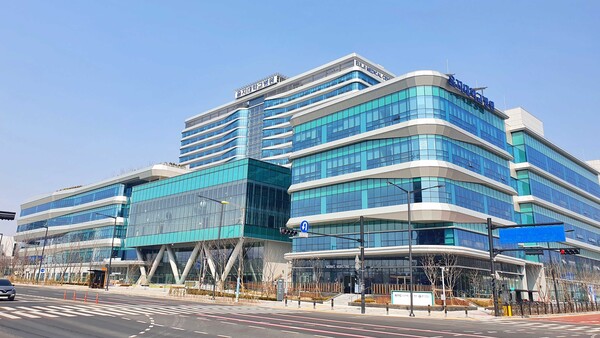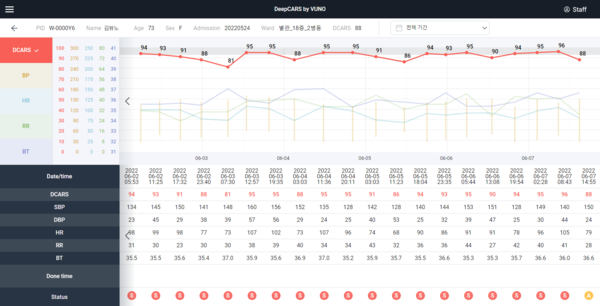An AI-powered cardiac arrest prediction system recently saved the life of a hospitalized patient at Uijeongbu Eulji Medical Center (UEMC), located in Gyeonggi Province to the north of Seoul.

According to the hospital, Professor Sun Hyun-woo and nurse Hong Moon-seok at the Rapid Response Team were conducting a routine check on a 53-year-old male patient on July 7, Friday.
However, they were taken aback by the patient monitor’s cardiac arrest risk score reading at 87, above the threshold of 85.
The cardiac arrest prediction system, based on Vuno’s VUNO Med-DeepCARS, was implemented just a week earlier at UEMC.
Recognizing the urgency, the Rapid Response Team quickly visited the male patient who was recovering from brain aneurysm surgery performed on June 26.
He was supposed to be discharged the next day, on July 8.
However, his condition took an expected turn on that Friday afternoon.
“I was told in the morning that I would be discharged the next day. But I started to feel unwell that afternoon,” the patient was quoted by the hospital as saying.
“I had a little fever and was a little lethargic, but I was surprised to see several doctors coming to me and telling me that I need to be examined and treated.”
The medical team provided immediate first aid, including fluids and antibiotics, took a CT scan, and transferred him to the intensive care unit.
The scan showed that he had sepsis due to pyelonephritis, elevating the patient's risk of cardiac arrest score to 87.
With sepsis being a life-threatening condition, the attending physicians, Professors Yoon Byeol-hee of Neurosurgery, Hong Yoon-hee of Neurology, and Sun Hyun-woo of Critical Care Trauma Surgery, collaborated to focus on sepsis treatment, including round-the-clock dialysis.

The pivotal factor in saving the patient’s life was the early detection by the AI-based cardiac arrest prediction system and the swift response of the medical team, UEMC said.
The patient's condition improved significantly, and he returned to the general ward without the need for invasive treatment or a ventilator.
“This is the first case of saving a patient after the introduction of the cardiac arrest risk monitoring system. By predicting and detecting high-risk patients in the general ward early, we were able to respond quickly,” Professor Sun, the leader of the Rapid Response Team, said.
UEMC is offering this cutting-edge system to patients aged 19 and older hospitalized in general wards to proactively prepare for potential emergencies.
The AI-based cardiac arrest prediction system, VUNO Med-DeepCARS, developed by Vuno, analyzes crucial vital signs such as age, gender, blood pressure, pulse, respiration, and body temperature of hospitalized patients using big data deep learning technology.
It provides physicians with a risk score ranging from 0 to 100, indicating the likelihood of cardiac arrest within 24 hours.
In early June, VUNO Med-DeepCARS was designated as an innovative medical device by the U.S. FDA, the first in the Korean medical AI industry.
VUNO is conducting clinical studies with medical institutions in the U.S. to launch the device in the U.S.
Related articles
- Korean AI medical imaging companies show impressive surge in share prices
- VUNO shares surge after FDA innovative medical device designation
- VUNO patents AI-based medical image analysis tech in US
- VUNO, Severance sign MOU to develop AI-based rare disease detection tech
- VUNO’s cardiac arrest-predicting device now available for children under 19
- 'VUNO Med-DeepCARS outperforms traditional methods in cardiac arrest prediction'

